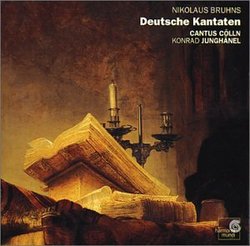| All Artists: Nicolaus Bruhns, Cantus Cölln Title: Nikolaus Bruhns: Deutsche Kantaten Members Wishing: 1 Total Copies: 0 Label: Harmonia Mundi Fr. Original Release Date: 1/1/2002 Re-Release Date: 5/14/2002 Album Type: Import Genres: Pop, Classical Styles: Vocal Pop, Opera & Classical Vocal, Chamber Music, Historical Periods, Baroque (c.1600-1750), Classical (c.1770-1830) Number of Discs: 1 SwapaCD Credits: 1 UPC: 794881669622 |
Search - Nicolaus Bruhns, Cantus Cölln :: Nikolaus Bruhns: Deutsche Kantaten
 | Nicolaus Bruhns, Cantus Cölln Nikolaus Bruhns: Deutsche Kantaten Genres: Pop, Classical
|
Larger Image |
CD Details |
CD ReviewsLong-awaited - a triumph! M. Holmes | Washington D.C., United States | 06/22/2003 (5 out of 5 stars) "C.P.E. Bach's obituary for J.S. Bach tells that his father "loved and studied" the music of Nikolaus Bruhns. The contrapuntal mastery of Bruhns's well-known and well-recorded organ works becomes immediately obvious upon first listening. The Bruhns cantatas, on the other hand, have received relatively few recordings. This document (by Cantus Colln) is only the second effort of its kind in the CD era (the first one by the Ricercar Consort on the Ricercar label is now out of print). German cantatas from the late 17th Century are finally getting the attention they deserve. Bruhns is only one of numerous examples in music history where a master composer goes out of fashion, only to be rediscovered when the climate and media are suitable for performance. As J.S. Bach was for Mendelssohn in the early 19th Century; Buxtehude, Schelle and Bruhns are for their recent champions of the turn of the 21th Century. These three composers, who are getting a great deal of deserved attention these days, were considered the greatest craftsmen of North German Church music in their day. Now we have the luxury to hear these works for ourselves after the mystical "Romantic" image of Bach has faded, and we can judge this music with fresh ears. Three of Bruhns's cantatas deserve special mention. Firstly, it is fair to contemplate how J.S. Bach (using whatever scarce free time he might have conjured in his early professional life) might have marvelled over the contrapuntal perfection in Bruhns's cantata "Muss nicht der Mensch auf dieser Erden in stetem Streite sein." This is a remarkable example of polyphony in that the exposition, episodes, and entries all seem to grow organically and effortlessly out of one another. This graceful manner rivals some of the best of Bach's fugues. The "textbook perfection" and evenness of Bruhns's counterpoint seems to go by almost unnoticed. The cantata "Ich liege und schlafe" is an important forerunner for J.S. Bach's later expanded cantatas with multiple sections. It is in the form of the "Concerto-aria cantata", which was first cultivated by Italians in mid-seventeenth-century Dresden, popularized in Germany, then taken further by Bruhns [We must consider Bach's earliest cantatas as fluid continuations of these forms. A prime example is Bach's cantata "Gottes Zeit ist die Allerbeste Zeit", which is not as chromatic as his later cantatas of the same genre, thus sounding more like a 17th century composition]. The other remarkable Bruhns cantata is "Hemmt eure Tränenflut", which lies on the threshold of eighteenth-century mixed cantata forms. One should pay close attention to the final "Amen" in which the beginning is quoted almost note for note in Bach's "Christ lag in Todesbanden" BWV 4. It's important to keep in mind that this music was written in a period where composers rarely intended for the parts to be doubled. The French innovation of "orchestral doubling" that later influenced Bach, Handel, and Telemann did much to change this. However, when we put Bach in the context of the North German cantatas, it't then easier to justify why conductors like Andrew Parrott and Joshua Rifkin perform and record Bach with one-per-part. There's not much to say about Cantus Colln's performance of the Bruhns cantatas other than the fact that this ensemble is clearly in its prime. Konrad Junghänel has been directing some of the highest level recordings of concerted vocal music in the past ten years (listen to their recordings of Schütz's "Psalmen Davids" or the cantatas of Buxtehude). Junghänel, together with his expert native German singers and his highly sensitive continuo section, just get better and better! If you want to hear baroque performance at its finest, you should not hesitate to buy this CD. On this recording are six of the twelve surviving Bruhns cantatas. Does this imply that Jungänel will release a Vol. 2 in the near future?An enthusiastic 5-stars!!!" Bruhns was a fine composer Critic at large | East Coast USA | 09/18/2005 (5 out of 5 stars) "Cantus Colln has done a great service for those who appreciate and wish to explore the German traditon of cantatas. The compostions of Bruhns are wonderful and the native German singers make the texts come alive through the wonderful music. I'd give it six stars if I could!
For the longest time I knew German masters such as Bruhns only through their organ music. Upon hearing recordings of music such as this, one realizes that these men were not one dimensional church composers, but sophisticated composers capable of much." |

 Track Listings (22) - Disc #1
Track Listings (22) - Disc #1